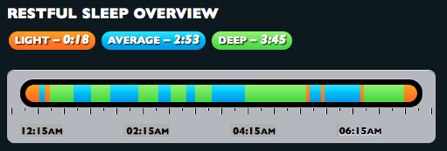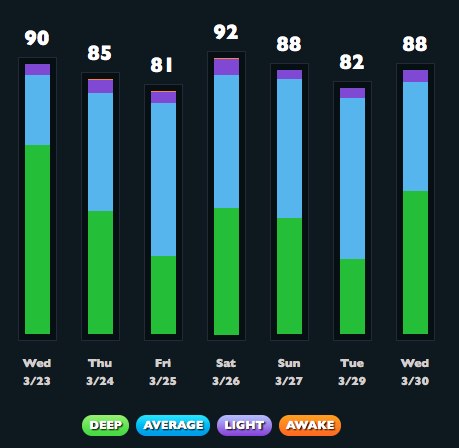I’ve been a big fan of psychology and awake/sleep states. When I was in my 20s I studied at The Monroe Institute (binural/hemisync) and really enjoyed exerting control over our these levels. These lessons have been with me through hypnosis training and applications far and wide. One segment of study that has always intrigued me is how we sleep. When do you fall through the cracks of consciousness and trying to catch the details beyond. Petty neat stuff.
These days with a life so busy the only self-study I’ve had focus for is ways of getting a better nights sleep and a more vibrant way to wake up. There are many products on the market that cost too much or have subscription prices which are untenable. Especially since I don’t have a sleep disorder. Enter Wakemate, a little company that uses actigraphy technology where you wear a wristband to sleep.
The Way We Move
The way the wristband works is to monitor your motion during your sleep cycles. We move around more when we are in ligher sleep than the motionless when we are in deep sleep.
 As you can see in the above screenshot when I first go to sleep I’m fidgety then it slows into some basic rhythms. Wakemate takes this data and turns it into something a bit more understandable (see below).
As you can see in the above screenshot when I first go to sleep I’m fidgety then it slows into some basic rhythms. Wakemate takes this data and turns it into something a bit more understandable (see below).
 This is data that can be used…
This is data that can be used…
When to Wake
If you had a choice would you rather wake up from a deep sleep or a light one? Generally when you wake up from a deep sleep it’s like rising out of a fog–you drag the full weight of sleep and try to find enough inertia to wake. That’s not the kindest way to wake in the morning. With Wakemate you use your smartphone (or iDevice) to set a wake up time window usually within 20m. If you wanted to wake up at 7:00am then Wakemate will attempt to find you in a light sleep from 6:40 with a forced alarm at 7:00am.
We’re Too Smart
Putting the idea into practice is a bit more interesting. The reality is we human’s are very adaptable and don’t like to be monitored or told what to do. Really, who loves their alarm?
Throughout most of the first week I was conscious going to sleep that there was something watching me. Waiting for me to sleep. I’d think in my mind, ‘I’m not asleep yet, but I’m motionless–it’s going to think I’m asleep–but I’m not.’ Strangest thoughts that would cross my mind. That eventually subsided as your caring for its opinion waned. Even so once and a while I know I’m moving my wrist now when I’m awake but motionless. Silly, right?
The rest of the nights sleep is your own. Waking though.. the alarm catches you. You roll over, little thoughts flit across your still mind and then the alarm catches you with one of it’s rather melodic tunes. That’s how simple the first few wakings were. From this point you are somewhat awake, pulling yourself out of that floating comfort zone might take some effort but you were closer than farther.
Adaptation is Amazing
Over time you adapt, you know it’s watching again when you wake. You roll over, this time as little thoughts flit within your head you have one that startles you… it says, ‘You’re awake, but if you move or do anything more than this thought the alarm will go off and this moment will be over.’ Now that’s amazing right?
Some mornings now I’ll pre-wake and make sure I am deadly still so that I might not leave my tranquil comfort zone. No matter what I am no longer surprised to hear the alarm. I rise up in sleep, acknowledge my conscious mind and then *alarm-chimes* it’s time to get up. Then the onslaught of psychological modifiers that want to beg me to stay warm and sleepy hit–Wakemate doesn’t help with those thoughts. It’s up to you and what your day has in store for you to wipe those away.
Getting Better Sleep
If finding out how to outwit technology isn’t something you care about maybe you just want to study your sleep. Wakemate allows you to see your sleep objectively over time.
 When we begin to watch our actions we can change our behavior (something to really remember). Wakemate allows us to catalog our evenings data with tags. Were you stressed, drink a lot of caffeine, have a late night, watch tv, fan on, fan off, etc. If you are doing your own sleep studies and want to see how a behavioral modification will effect you. Do a trial of a week with or without the behavior and correlate your own information on better/worse nights sleep. Not a bad beginning for <$60.
When we begin to watch our actions we can change our behavior (something to really remember). Wakemate allows us to catalog our evenings data with tags. Were you stressed, drink a lot of caffeine, have a late night, watch tv, fan on, fan off, etc. If you are doing your own sleep studies and want to see how a behavioral modification will effect you. Do a trial of a week with or without the behavior and correlate your own information on better/worse nights sleep. Not a bad beginning for <$60.
Future Thoughts
Wakemate has taught me to recognize it when I am lightly sleeping and if I am of a good mindset I can act upon it easily. I don’t know how much I’ll use Wakemate as my alarm though because of how I get snarky about waking up by being monitored. My favorite part of Wakemate is evaluating my evenings sleep and knowing that I can get a good night sleep by changing a few things in my routine for the day.
- Currently we have a very shallow way of working with our data and after reading and voting within the User Voice Wakemate community know that they want to give us this type of functionality.
- Let me add context to the evening’s sleep; if I remember dreaming at 1am then lets add notes to a timeline.
- System corrections, sometimes the actigraphy is off–I was awake at 3am but there it says I was not. One thing white papers talk about on actigraphy as that it needs to be trained to the individual. Right now I don’t know how or even if the Wakemate system has any adaptation to you as an individual. Let the users help.
- Wakemate requires at least 4 hours before it will offload your data, what about nappers (being worked on)
- Interruptions, if I have to use the restroom the iDevice might complain that it can’t reach the wristband. I need to have a pause or Sleep Interrupt button. Especially with a newborn on the way this device is not going to be able to keep up with that style of sleep but I’d love to record it so I can help adapt to it.
- Exporting of Actigraphy data, let me at my data–I want to run cool plots of my own.
- Longer battery life. Currently we get 1 maybe 2 days of charge.
Wakemate is in it’s infancy and has a lot of good room to grow. I hope they can continue to pull in ideas and desires of their public to make better and better ways of looking at a time in our life we usually feel we have little control over.
Sleep well.
